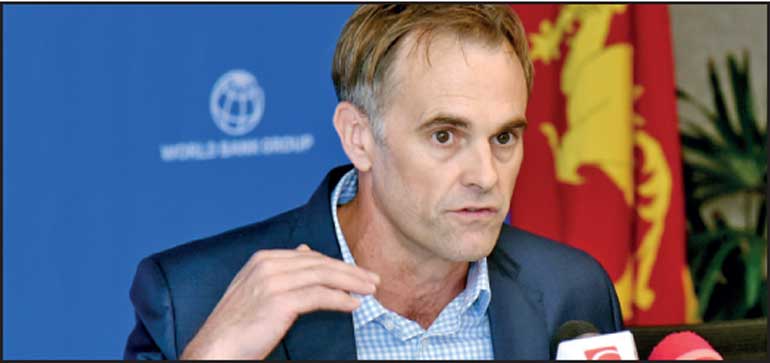Wednesday Feb 25, 2026
Wednesday Feb 25, 2026
Wednesday, 8 October 2025 00:36 - - {{hitsCtrl.values.hits}}

World Bank Senior Country Economist for Sri Lanka and the Maldives Richard Walker
The World Bank yesterday outlined a critical package of reforms it says Sri Lanka must push through to attract capital, revive exports and build long-term competitiveness, warning that export growth has slowed and foreign direct investment remains far too low to meet the country’s growth objectives.
World Bank Senior Country Economist for Sri Lanka and the Maldives Richard Walker said the country’s export and investment performance remained weak.
“Export growth has slowed, and foreign direct investment continues to hover around 0.5% of GDP, far below what Sri Lanka needs to reach its $ 36 billion export target by 2030,” he said, speaking at the launch of the World Bank’s Sri Lanka Development Update.
He identified several areas where reforms were critical. “Policy consistency is key,” he said, adding that fiscal reforms must continue to strengthen tax administration and establish a transparent framework for managing tax expenditures.
“Spending better and more progressively, while continuing tax reforms, will help balance growth, debt sustainability, and equity.” He said enforcing cost-reflective utility pricing remained essential for ensuring the financial viability of state enterprises.
Walker cautioned that monetary policy must remain well-calibrated to control inflation and prevent excessive credit growth, with continued vigilance over financial sector risks, including high non-performing loans and the exposure of banks to Government debt.
He said there has been a sort of softening of monetary policy, but warned that it has to be calibrated to mitigate inflationary pressures as well as the unsustainable build up in private sector credit.
He noted progress on State-owned bank governance and ownership and said reforms should continue to deepen the financial sector and support credit to the real economy.
Walker also called for maintaining exchange rate flexibility so the currency can absorb shocks and reserves can be rebuilt.
Walker said long-term competitiveness would depend on structural reforms in three areas. The first is trade and investment.
“Enhancing competitiveness and spurring private sector-led growth means reducing the economy’s inward orientation and streamlining trade policy,” he said. He urged para tariff reforms, “really trying to remove and lift these paratariffs, which are, to some extent, moderate revenue generators, but hugely distortionary in terms of the market and the export sector.”
He also called for enhancing customs administration, “the systems, the capacity, and the processes to really drive and facilitate trade and not just be seen as a mechanism or means to generate revenue.”
He said regulatory and legal reforms under the Economic Transformation Act should be fast-tracked to attract investment, including finalising the Public-Private Partnership framework and establishing an Economic Commission to position, support, promote and facilitate investment.
“Caps on foreign direct investment in certain sectors need to be revisited and reviewed to understand whether there are potential constraints to investment in important sectors,” he said.
The second area is improving the oversight and management of state-owned enterprises to enhance competitiveness in key sectors. Walker pointed to finance, the leisure sector, agriculture, IT and service delivery.
“There certainly is a role there to improve the performance of these institutions and also potentially look at ways of bringing in private sector participation,” he said.
“What is the policy right now in terms of private participation into State-owned enterprises, particularly in sectors where they are economically and financially viable commercially? What is the plan in terms of trying to bring in more private participation, which is critical for the infusion of new ideas, new technologies, and to support and boost the competitiveness of SOEs?”
The third area is factor market liberalisation, especially labour and land. “Right now, there is multiple legislation that goes back even 60, 70 years that investors and firms have to wade through,” he said.
“As a result, this means firms and potential hires of labour are a bit more cautious about taking on labour. Also, it has implications, particularly for female labour force participation.” He called modernising these laws a low-hanging fruit to bring more competitiveness into the labour force.
On land, he said “Sri Lanka is about 80% owned by the State,” but overlapping mandates and unclear ownership make it difficult for investors, reduce farmers’ agricultural productivity and undermine the sustainable use and management of land.
Walker said he is generally positive about the Government’s recent performance in stabilisation and emphasised the need to continue with policy consistency. On structural reforms, he was more concerned and pressed for faster movement in these areas so Sri Lanka can mobilise more investment, boost exports and make sustained progress toward the $ 36 billion export goal by 2030.